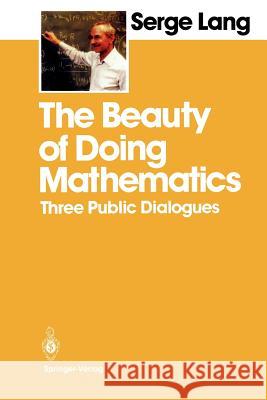The Beauty of Doing Mathematics: Three Public Dialogues » książka
The Beauty of Doing Mathematics: Three Public Dialogues
ISBN-13: 9780387961491 / Angielski / Miękka / 1985 / 144 str.
If someone told you that mathematics is quite beautiful, you might be surprised. But you should know that some people do mathematics all their lives, and create mathematics, just as a composer creates music. Usually, every time a mathematician solves a problem, this gives rise to many oth ers, new and just as beautiful as the one which was solved. Of course, often these problems are quite difficult, and as in other disciplines can be understood only by those who have studied the subject with some depth, and know the subject well. In 1981, Jean Brette, who is responsible for the Mathematics Section of the Palais de la Decouverte (Science Museum) in Paris, invited me to give a conference at the Palais. I had never given such a conference before, to a non-mathematical public. Here was a challenge: could I communicate to such a Saturday afternoon audience what it means to do mathematics, and why one does mathematics? By "mathematics" I mean pure mathematics. This doesn't mean that pure math is better than other types of math, but I and a number of others do pure mathematics, and it's about them that I am now concerned. Math has a bad reputation, stemming from the most elementary levels. The word is in fact used in many different contexts. First, I had to explain briefly these possible contexts, and the one with which I wanted to deal."











